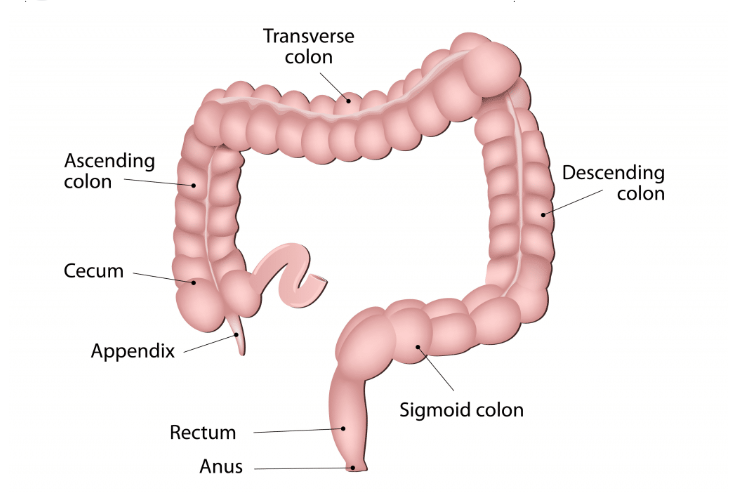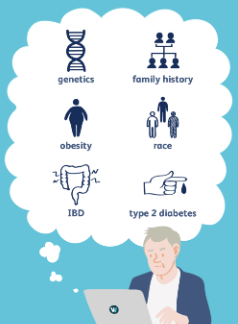Last Wednesday, the American Cancer Society (ACS) released their annual report on cancer deaths in the United States. According to this new data, we now know colon cancer is the leading cause of cancer deaths in young men and the second in women under 50 years of age.
While there is an overall drop in cancer deaths, according to the report, this progress is overshadowed by the rise in colon cancer. “The continuous sharp increase in colorectal cancer in younger Americans is alarming,” said Dr. Ahmedin Jemal, senior vice president at the American Cancer Society and senior author of the study.
In This Article: (6 min read)
- What is Colon Cancer and Risk factors
- Symptoms of Colon Cancer and How To Prevent It
- How Colon Cancer Is Treated
What is Colon Cancer?
🩹Colon cancer (more accurately called colorectal cancer) is a disease that develops due to the uncontrolled growth of cells in the colon or rectum.
🩹The colon is the large intestine or large bowel, and the rectum connects the colon to the anus.
🩹Colorectal cancer often begins as an abnormal growth called a polyp inside the colon or rectum.
🩹Screening tests such as stool test or colonoscopy are effective in identifying polyps, allowing for their removal before they develop into cancer.
🩹Colorectal cancer is more common in men than women and among those of African American descent.
🩹Colorectal cancer has moved up from being the fourth leading cause of cancer death in both younger men and women two decades ago to first in men and second in women, according to the ACS’ annual report.

Parts of the colon (large bowel)
What Are the Risk Factors of Colon Cancer?
The risk factors for colorectal cancer can be categorized into those that are modifiable and those that are not.
Factors you cannot modify include increasing age, personal history of colorectal polyps or cancer, inflammatory bowel disease such as crohn’s disease or ulcerative colitis, family history of colorectal cancer, genetic syndromes (like familial adenomatous polyposis and lynch syndrome), and ethnicity.
Ethnic groups, such as American Indian and Alaska Native populations, African Americans, and Ashkenazi Jews, have higher rates of colorectal cancer.
Factors that can be modified are lifestyle choices. These lifestyle factors that may contribute to an increased risk of colorectal cancer include:
- Lack of regular physical activity.
- A diet low in fruit and vegetables.
- A low-fiber and high-fat diet, or a diet high in processed meats.
- Overweight and obesity.
- Alcohol consumption.
- Tobacco use.

Factors that increase risk for colon cancer
Symptoms of Colon Cancer
Colorectal polys and colorectal cancer don’t always show symptoms, especially at the initial stages. Someone could have polyps or colorectal cancer and not know it. That is why getting regularly screened for colorectal cancer is very important. Symptoms of colorectal cancer include the following:
- A change in bowel habits.
- Blood in or on your stool (bowel movement).
- Diarrhea, constipation, or feeling that the bowel does not empty all the way.
- Abdominal pain, aches, or cramps that don’t go away.
- Weight loss that is unexplained.
Talk to your doctor if you have any of these symptoms. They could also be due to another medical condition. The only way to know for sure is to see a doctor.

People with colon cancer may not have symptoms initially. Abdominal pain, cramps, or aches that don’t go away is one of the symptoms.
How To Get Screened for Colon Cancer
Screening tests are done to find a disease when there are no symptoms. Colorectal cancer almost always starts from abnormal growths called polyps in the colon or rectum.
Screening tests discover abnormal growths (polyps), so they can be removed before they become cancer.
The U.S. Preventive Services Task Force (USPSTF) recommends that adults get their first screening for colorectal cancer at age 45. The American Cancer Society (ACS) recommends a colonoscopy screening for colorectal cancer every 10 years after that until age 75.
High-risk individuals might need to start colorectal cancer screening before age 45 and be screened more often.
The Task Force recommends screening strategies that include stool tests, flexible sigmoidoscopy, colonoscopy, and CT colonography (virtual colonoscopy).
Stool DNA test should be done every 3 years and can be done in the privacy of your own home. Cologuard, the only test currently available in the US, tests for both DNA changes and blood in the stool.
Does Health Insurance Pay for Colon Cancer Screening?
Colorectal cancer screening is a preventive service that the Health Insurance Marketplace and many other health plans are required to cover.
Medicare covers several colorectal cancer screening tests for its beneficiaries. Talk to your provider to be sure.
How Is Colon Cancer Treated?
Treatment options for colorectal cancer include surgery, radiotherapy (radiation), chemotherapy, targeted therapy, immunotherapy.

Colon cancer screening and healthy lifestyle choices are the cornerstones for prevention.
Bottom Line
In the battle against colorectal cancer, our greatest weapons are prevention and early detection. It’s crucial to recognize the significance of lifestyle choices in shaping our risk factors.
By adopting a healthy lifestyle — embracing regular physical activity, maintaining a diet rich in fruits and vegetables, avoiding processed meats, managing weight, limiting alcohol consumption, and abstaining from tobacco — we can actively reduce our susceptibility to colorectal cancer.
By embracing prevention and early detection (ie, screening), we move closer to a future where colorectal cancer is not just treatable but preventable, ensuring longer, healthier lives for all.

